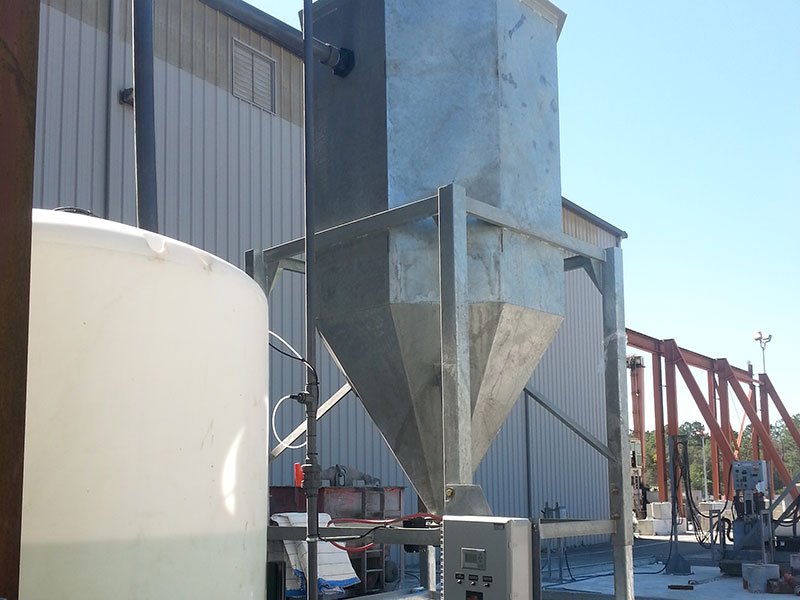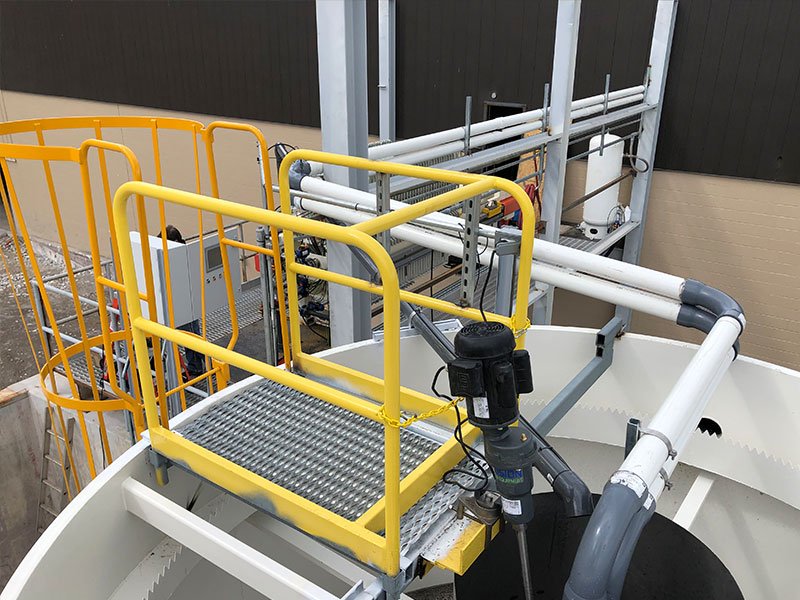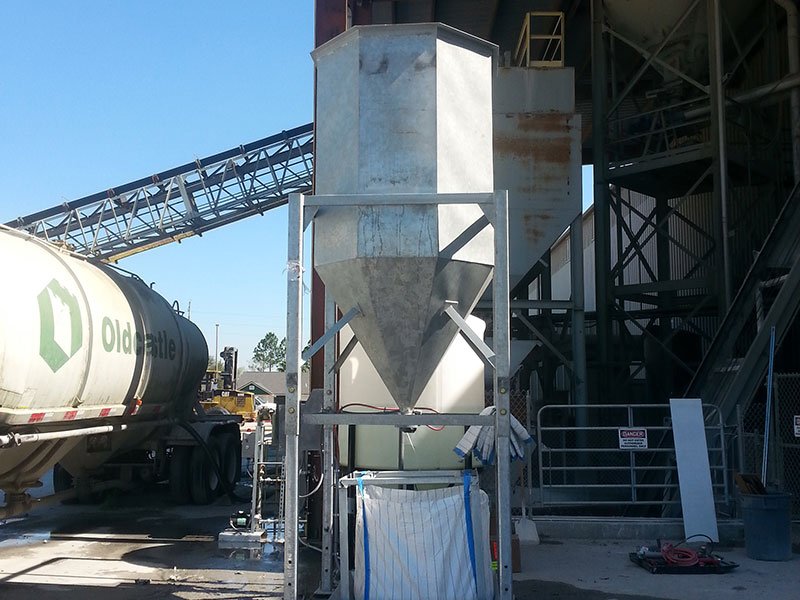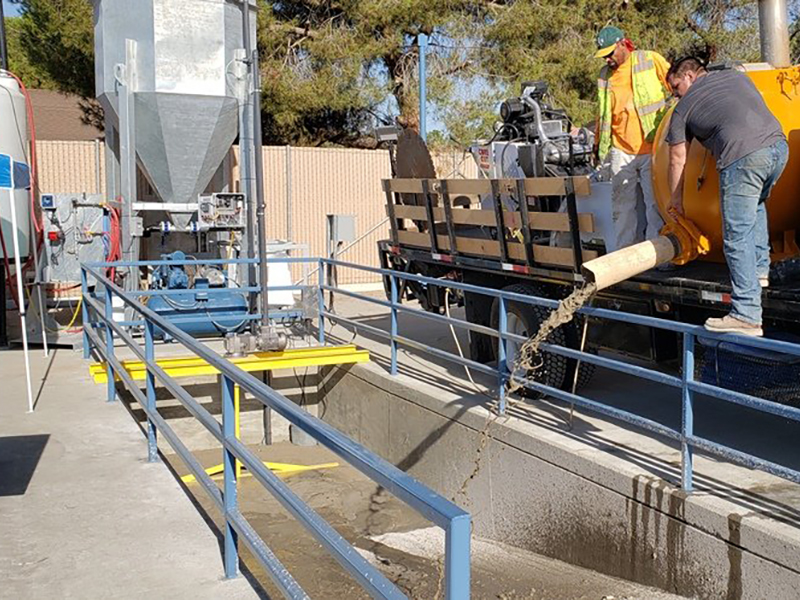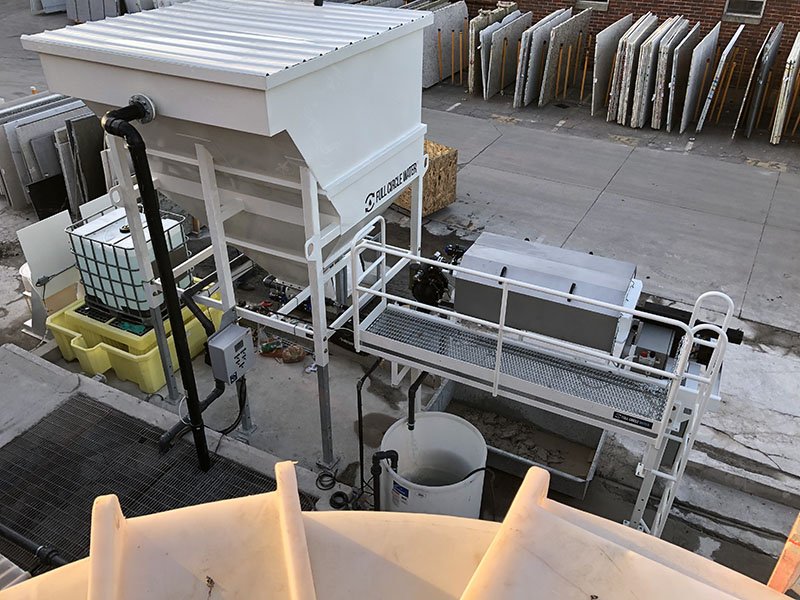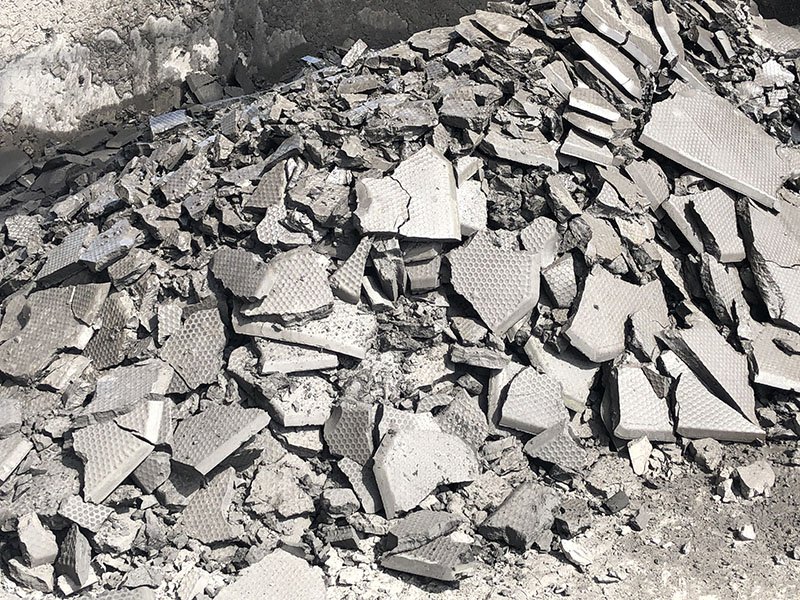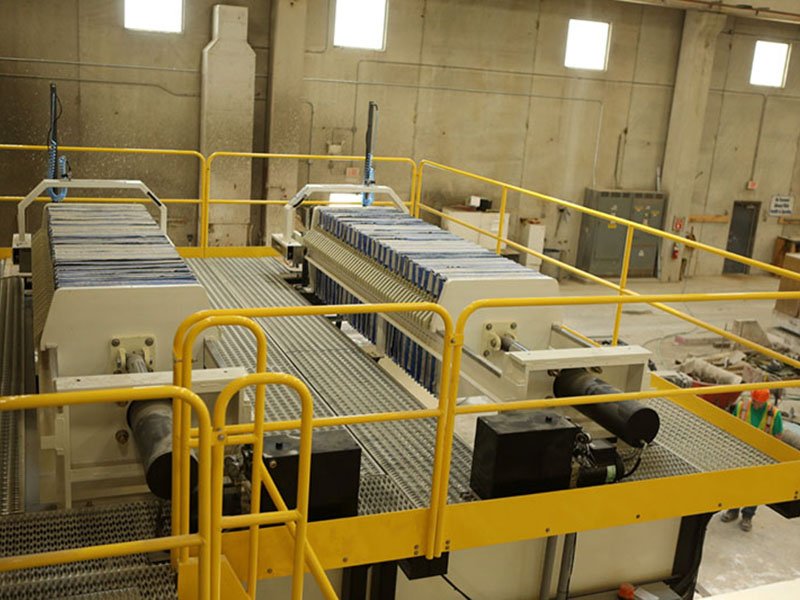DECANT A WIDE RANGE OF SLURRY
The Decanting Silo was designed for customers on a budget that have needs up to 20 gpm. The simple, yet effective design utilizes polypropylene tanks with center feed technology and our proprietary polymers for faster settling. Proper settings and once a day purging will help this system run with little maintenance or trouble.
- Turnkey solutions with integrated HMI and controls
- Many options available as add ons to the system including
- Pit stirrers, pumps, chemical feed equipment, filter presses, sludge dewatering bags, and pH balancing.
- Full automation available
- Simple to use
- Virtually no downtime
- Galvanized, 2 part epoxy, and stainless options
- Decants a wide range of slurry
- Can be paired with sludge skids or filter presses for dewatering the accumulated sludge
SLS-16
SLS-18
SLS 8-20
SLS 12-26

Needing Help With Your Slurry?
Drop us a line or give us a call to discuss your specific application.
Simple to use and virtually no downtime!
Slurry Silo’s are used extensively in the Concrete and Stone industries. The silos are designed to separate sludge and solids from water via decanting. The slurry is pumped from your pit into the top center collection chamber where polymers can be added and mixed to greatly increase water clarity. The concrete and stone fines fall towards the bottom cone as the water moves down and around the center feed tube. As the water rises up the vertical sidewalls the smaller particles slowly settle out until the clarified water spills over the top output tray on its way to a collection tank to be reused in your processes. The towers are designed to minimize plugging and facilitate cleaning and purging of collected solids.
There are very few moving parts ensuring reliable and simple operation. The Slurry Silo’s are designed to require very minimal time on maintenance or cleaning. When used in conjunction with a filter press, water clarity can be greatly improved. The Slurry Silo reduces filter press downtime exponentially and extends press runs between cycles.
These systems work great on their own with our skid mounted sludge bags. Sludge collects in a specially-designed porous bag where the remaining water weeps out. Once the bag is full, it can be removed by a forklift. The Slurry Silo also works well as a pre-treatment for water that will ultimately go through a filter press. We are happy to integrate the Decanting Silo with existing equipment.
How does it work?
Like our Rapid Settlement Systems, the Slurry Silo is a type of clarifier that relies on gravity. The silos are designed to minimize plugging and facilitate cleaning and purging of collected solids. Because there are few moving parts, it’s both reliable and simple to operate. You won’t need to spend excessive time on maintenance or cleaning.
These systems work great on their own with our skid mounted sludge bags. Sludge collects in a specially-designed porous bag, where the remaining water weeps out. Once the bag is full, it can be removed by a forklift. The Slurry Silo also works well as a pre-treatment for water that will ultimately go through a filter press. When used in conjunction with a filter press, the Slurry Silo reduces filter press down time exponentially and extends press runs between cycles.
What applications is it used for?
The design of the Slurry Silo is a bit simpler than the Rapid Settlement System and doesn’t rely on plates, which means that it works best for applications with solids that settle very quickly, like sandstone and concrete.
Are they all they all the same?
Slurry Silos can be customized to your particular needs. The equipment lends itself well to a larger system—for instance a Filter Press Plant. Additional features can be incorporated into your Slurry Silo, such as mixers, scrapers, and automatic vs. manual purge valves to provide you a deeper level of control over your wastewater operation.
Revolutionizing Stone Fabrication slurry water solutions!
Solutions for Stone
Full Circle Water has thousands of satisfied clients throughout North America
We manufacture equipment right here in St Joseph, MN. We are family owned and believe you should be demanding of the equipment we manufacture.
Solutions for Stone
Stone, granite and glass fabrication shops throughout North America understand the need to recycle their sludge water. Not only does stone water recycling allow water reuse and significantly reduce water use and costs – collecting the sludge aids in meeting federal, state, and local laws, regulations and ordinances.
Stone industry water involves multiple challenges. Individual stones such as granite, slate, limestone, sandstone, and fieldstone each have unique characteristics. Glass is similar to these stones. Full Circle Water understands the challenges and offers industrial wastewater solutions such as filter press, lamella clarifier, vacuum drums, and silo systems.
Many of today’s consumers are searching for fabricators that utilize environmentally friendly business practices. Recycling water can be one of your most important marketing benefits.
Sludge water produced from stone fabrication presents unique challenges in sludge removal and in recycling of the water. The nature of the slurry varies by stone type, by shop equipment mix and by specific operation of equipment. The largest issue is the removal of suspended solids (slurry) from the waste water.
Offering multiple solutions to your challenging problems makes FCW unique. Most manufacturers offer one technology. Many times this leads to unsatisfactory results and an unhappy customer.
No matter the stone processed, the resulting stone water sludge contains a very concentrated amount of suspended solids. Stone industry water is made up of small particles of stone of various sizes ranging from as small as a fraction of a micron to as large as 100’s of microns, for reference, a cross section of human hair is about 50 microns. Most of the suspended solids in the water are from 1 to 80 microns, by count they tend to be 1 to 10 microns. By overall mass the vast majority of the stone water sludge is in the 20 to 50 micron range.
What makes your slurry settle out of suspension is the size and specific gravity of the stone water particles. The higher the specific gravity and density, the faster it settles. The larger the particle the faster it settles. Some of the stone water particles can be so small that they actually will float in water for days before settling out.
Issues with Recycling
In stone industry water suspended solids of a certain size must be removed from the recycled water due to equipment specification (saws can use straight slurry water; cnc’s need very clean water). Suspended solids also cause premature pump failure, equipment and piping clogs, and issues with trenches and pits. Suspended solids also tarnish the polish of stone surfaces (most firms find polishing with water over a certain micron rating causes finish issues on the product surface. All equipment life and reliability is affected (pumps, nozzles, hoses and components wear faster in environments with suspended solids).
An emerging issue in stone industry water is long term corrosion of metal components from a combination of pH levels and other substances (alkalinity, hardness, dissolved solids, temperature, etc) in the recycled water. This is exacerbated by chlorination – which is particularly harmful to metal surfaces on your equipment. A good solution for your stone water recycling will take corrosion into consideration.
Full Circle Water offers a complete line of industrial wastewater products to meet your specific stone, glass, and granite water treatment needs. Many of our clients are interested in what makes each type of wastewater treatment equipment different so we’ve added the following information to give a brief explanation of the most widely accepted methods of treating sludge water. The stone industry presents unique challenges in filtering and recycling water.
Filter presses
(also known as plate and frame presses) are used in stone, glass, and granite water and wastewater treatment systems to normally dry sludge that has a high water content. They have also been used in the stone industry for treating slurry water. They typically operate with a pneumatic diaphragm pump pumping slurry from a pit into the press. The press has numerous plates (each of which has a plastic outer frame and a filter cloth interior) that are held together under about 5000 lbs of pressure. Slurry water is pumped through the press and the filter cloth collects a large majority of the sludge in the water. As the press fills with sludge the pumping rate slows down and eventually the backpressure on the press stops the pump from pumping. At this point or before on a prescheduled basis the shop opens the hydraulic ram and cleans the plates off. Depending on the size of the press and the sludge volume this can take between 45 minutes and 3 hours. Presses come in a variety of sizes and are rated in cubic feet of mud capacity.
Presses require filter cloth replacement on a semi-regular basis depending on the material being filtered and the employee cleaning the plates. Presses are known for producing consistently good quality of water typically in the 1 to 5 micron range. Presses do require a larger amount of storage of clean water and frequent cleanings
Rotary Vacuum Drum
filters utilize a slowly moving drum surface to filter sludge out of the water. They are known for producing very clean water and dry sludge – but do so at a higher cost and at a slow rate. The drum rotates on a horizontal axis – usually partially submerged in the slurry water to be filtered. A vacuum sucks the slurry through the drum surface where the sludge that is too large to make it through is filtered. The remaining water passed through to a clean water tank or pit. As solids build up on the outside of the drum they are scraped off by a blade and fall into a cart for easy disposal.
Vacuum drum filters require a chemical treatment process to build a filter layer on the drum surface prior to treating the water. This usually is done daily by an employee. The costs to operate a vacuum drum include the chemical to build the filter layer, the time of the employee to do it, a higher amount of electricity than other methods of sludge removal, and the maintenance on many moving parts. Vacuum drums do deliver clean water at about 1 micron on a consistent basis.
Silo systems
are widely used to cost effectively treat high volumes of slurry water. Silo systems utilize settling instead of filtration to do this. They can deliver very clean water but require chemicals to do so. They can work without chemical settling agents or can use a large amount of chemical agents depending on the volume of sludge and the clarity of water needed. They are comprised of a large tank anywhere from 1000 gallons to 20,000 gallons (sized according to solids and volume based on settling rates of the slurry) – a pump to pump slurry into the system and a method of removing the solids collected from the bottom of the silo – typically this is done with a dumping valve or a pump. The sludge removed will be more wet than from a press or vacuum drum and can be further processed if needed by drying outdoors or by running through a press or large cloth sack to remove excess water. The advantages of a silo system are in the quantity of slurry water that can be treated in a given amount of time and in hands free operation. The disadvantage is a wetter sludge collected.
All In Ones and Rapid Settlement Systems
are similar to silo systems but utilize multiple plates and surfaces along with fluid dynamics to effectively reduce the amount of time needed to settle suspended solids (sludge) out of slurry water. They can be sized from a few hundred gallons and a handful of plates to thousands of gallons and hundreds of plates. Rapid settlement systems utilize an automated dumping mechanism to purge sludge settled out of the system into a large weeping bag filter. As with the silo system rapid settling systems can be utilized without chemical settling agents or can be used with them to promote faster settling and smaller equipment for the specific application. The advantage of these systems is the small footprint as opposed to a silo system and they can be much smaller in size and treat a larger amount of water than a typical silo system. They produce similar mud to a silo system and can utilize small filter presses to dry the mud further if needed.
In the stone industry filter presses and rotary vacuum drums are typically utilized in smaller countertop shops and in shops that do a large volume of cnc work and polishing. Larger countertop shops will often utilize a silo or rapid settlement system along with a filter press or bag filter system for their cnc’s and polishing equipment. Saw shops and quarries tend to utilize a silo or rapid settlement system to handle the large quantities of sludge produced.
Revolutionizing Stone Fabrication slurry water solutions!
Solutions for Concrete

Needing Help With Your Slurry
Guess what we can help you with your slurry needs. Our CEO Joe will spend the night at your house to make sure all your slurry problems are solved.
Full Circle Water has thousands of satisfied clients throughout North America
We manufacture equipment right here in St Joseph, MN. We are family owned and believe you should be demanding of the equipment we manufacture.
Solutions for Concrete
Concrete slurry can be challenging for the concrete industry to control and dispose of properly. With Slurry Silo Plants, slurry can be effectively managed allowing for easy disposal of the accumulated sludge and reuse or discharge of the water.
The Slurry Silo Plant features turnkey solutions with integrated HMI and controls as well as additional options including:
- pH balancing skid
- Gear reducing mixers and scrapers
- Filter press dewatering
- Stainless steel
- Automatic filter press
- Customized integration with existing equipment
Do you need a cost-effective, no-nonsense tool for cleaning up your wastewater? The Slurry Silo is a great option for a variety of applications. The system quickly removes over 90% of the solids out of your slurry utilizing settling, a polymer feed step, and gravity flow. The proprietary steep cone design is uniquely qualified to handle heavier slurries from water to maximize the sludge thickening process. Proper settings and once a day purging will help this system run with little maintenance or trouble.
The Slurry Silo is a reliable system with few moving parts, requiring very little training to operate the system and virtually no downtime. The Decanting Silo was designed for customers on a budget that have needs up to 20 gpm. At a low consumable cost, the steady high-volume flow and clarified water staging tank allow for constant real time processing. This eliminates the inconvenience of small batches. The system features galvanized parts, making the equipment durable and long-lasting.
How does it work?
Like our Rapid Settlement Systems, the Slurry Silo is a type of clarifier that relies on gravity. The silos are designed to minimize plugging and facilitate cleaning and purging of collected solids. Because there are few moving parts, it’s both reliable and simple to operate. You won’t need to spend excessive time on maintenance or cleaning. When used in conjunction with a filter press, you can count on very clean water. The Slurry Silo reduces filter press downtime exponentially and extends press runs between cycles.
These systems work great on their own with our skid mounted sludge bags. Sludge collects in a specially-designed porous bag where the remaining water weeps out. Once the bag is full, it can be removed by a forklift. The Slurry Silo also works well as a pre-treatment for water that will ultimately go through a filter press. We are happy to integrate the Decanting Silo with existing equipment.
What applications is it used for?
The design of the Slurry Silo is a bit simpler than the Rapid Settlement System and doesn’t rely on plates, which means that it works best for applications with solids that settle very quickly, like sandstone and concrete.
Are they all the same?
Slurry Silos can be customized to your particular needs. The equipment lends itself well to a larger system—for instance a Filter Press Plant. Additional features can be incorporated into your Slurry Silo, such as mixers, scrapers, and automatic vs. manual purge valves to provide you a deeper level of control over your wastewater operation.
